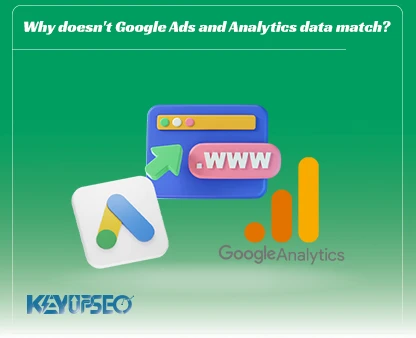
Types of keyword matching in Google Ads
Let's examine the types of keyword usage in Google ads or the adaptation of keywords and their role in improving advertising campaigns.
Even if you have worked with the Google AdWords advertising platform once; You have probably found that keywords are the most basic determining factor in this network.
Google Ads' intelligent algorithm has provided advertisers with the ability to better target audiences by using capabilities known as keyword matching.
When you attract more users, it will improve your site's SEO and you will get a better position in Google, which will result in increasing Organic Google Traffic for the site.
Stay with us at Keyupseo to learn the types of keyword matching in Google Ads and how to choose each type of keyword.
What is keyword matching?
As you know, the Google Ads algorithm uses keywords to find target audiences and show them your ads.
Factors called Keywords Match Types are included in this smart algorithm that determine the matching of keywords of your campaigns with Search Query by users.
According to Google's latest update in this field, the types of keyword adaptation can be classified into the following 3 groups.
- Exact Match
- Phrase Match
- Broad Match
Each of these adaptations has its advantages and disadvantages and are used according to the needs of users, which we will examine each of them in the rest of this article.
Exact Match
As its name suggests; Fine Match is known as the most focused keyword match in the Google Ads network.
The way this adaptation works is that your ads will be shown to users if they use exactly the same terms as the keyword in their search queries, and of course in the same order.
To choose this type of matching, you only need to use [Bracket] sign at the beginning and end of your keyword.
For example, if you choose [buy laptop] as your keyword; Users can see ads only if they search for the term "buy laptop".
Recently, however, Google has implemented changes in the exact matching of keywords, which have not been liked by users.
Currently, according to the new structures that Google has specified; If you choose exact match for your keywords; It is possible that searching for synonyms or similar terms will also show your ads to users.
For example, if we consider the phrase [buy laptop] as the keyword of our campaign; Users may also see our ads by searching terms such as buying an Asus laptop or a Lenovo laptop.
Phrase Match
Phrase matching in Google AdWords offers some of the flexibility of broad matching in targeting audiences, but it has more control over this targeting and limits the target audience to the groups you specify.
Using this type of matching, your ads will be shown to users whose search terms match the same format and order that you used in your keywords.
In using this adaptation, phrases with the same meaning or close to the meaning of the keyword also cause the advertisement to be shown to the users.
To use this adaptation, you only need to place double quotation marks at the beginning and end of your keyword.
The example of "home medical services" is a good example of this if you choose it as your keyword. Your ads may be shown to users who search for terms like doctor on site.
Broad Match
Extensive keyword matching is considered as the default matching model in Google Ads and targets the largest number of users.
If you choose this type of keyword matching, your ads will be shown to people whose search terms include any of your selected keywords or similar words.
Note that in broad keyword matching, if the words that users use in their search terms have a different order than the form of your keywords; Again, your ads will be shown to those users.
For example, if your chosen keyword is plane tickets; Your ads will be shown with terms such as train ticket, airplane ticket or even Mashhad flight which does not include any of your keywords.
We suggest that you use some caution when choosing broad keyword matching. It is true that this type of adaptation will bring you more clicks, but you should note that choosing this adaptation does not lead to spending your budget on traffic that does not have a good return for you and a low conversion rate (CVR) for Register yourself.
Broad matching vs. phrase matching
The key difference between broad and phrase matching is that in phrase matching, fewer clicks are taken, but their quality is higher and they usually result in higher conversion rates for campaigns.
However, wide compliance is designed in such a way that the number of clicks received is high, but the users who enter your landing page may not be looking to buy a product or use the services you provide.
Goodbye to Broad Match Modified
Broad Match Modified has been another type of keyword matching in the Google Ads network, which has a similar application to broad matching, but the difference is in more accurate targeting of audiences.
The way this adaptation works is that by placing a + sign before a word, we specify that our ads will only be shown to those who have the word specified by us in their search queries.
For example, if you used the word +laptop in your ads; Ads were shown to users if the same word laptop was present in their search terms.
But today, it is no longer possible for users to use this adaptation of keywords; Because according to Google's decision, from July 2021, word matching has replaced this matching and has had a function almost similar to it.
If you are one of the people who used Broad Match Modified to target your keywords; You can still see these words with a + sign in the keyword list of your campaigns.
Negative Keyword Match Types
As you know, negative keywords are terms specified by you and if users' search queries include them; Ads will not be displayed for them.
Negative Keyword Match Types is a factor that helps you target negative keywords more precisely. Negative Keyword Match Types are divided into 3 different groups, and in the rest of this article from the Keyupseo blog, we will examine each of them.
Negative Phrase Match
The way Negative Phrase Match works is that if the user's search query is in accordance with the negative keywords that you have entered and the form and order of their placement is also similar to your negative keyword; Ads are not shown to them.
Also, if there are additional words in the search queries of users, if the order of placement of the words is in accordance with the order of negative keywords; Again, ads are not shown to users.
However, you should note that some search queries may include additional characters that, if their order is similar to negative keywords, will show ads to users. It is worth noting that to select this type of compliance you need to use double quotation marks ("") at the beginning and end of your negative keyword.
Negative Exact Match
In the exact matching of keywords, if the user's search query is exactly the same as your negative keyword and there is no additional word in its structure, and the order of placing the words is the same in both of them; Ads are not shown to the user.
To select this type of match on negative keywords, all you have to do is use [brackets] at the beginning and end of your negative keyword.
Negative Broad Match
As with broad compliance; Broad negative keyword matching is also known as the default matching model in Google Ads.
Using this adaptation, if users use all parts of the negative keywords selected by you in their search queries; Ads are not shown to them.
Note that the order of placing the words in this adaptation is not important and if all parts of the negative keyword are present in the user's search term; Ads will not be displayed for them.
In using Negative Broad Match, there is no need to put any sign and you only need to write your negative keyword in the list.
For example, if you choose the keyword iPhone mobile as your negative keyword; Search queries such as buying rose gold iPhones or iPhone mobiles will display your ads, but search terms such as buying iPhone mobiles, iPhone mobiles or the negative keyword of iPhone mobiles will not show your ads to users.

Advantages of choosing keyword matching in Google Ads
Keyword matching is considered as a factor that plays a significant role in developing the performance of advertising campaigns. In fact, using these adaptations will help you bid on those keywords that will yield the best returns for your campaigns.
There are many advantages to using different types of keyword matching in Google Ads, some of the most important of which are as follows.
-
Check the up-to-date performance of keywords
Checking which of the selected keywords have shown better performance over time; It helps us to understand which of the keyword adaptations have correctly identified the target audience and caused factors such as conversion rates to rise.
-
Examining the structure of competitors' advertisements
As you use different keyword combinations to better target your audience; So do your competitors. Examining which search terms your competitors are bidding on and how they have shaped their keyword structure over time will help you gauge the success or failure of various keyword matches.
-
Determining the amount of the proposed cost
The Cost Per Click and Cost Per Conversion factors are largely influenced by the bid amount. Obviously, most advertisers want to get the most out of their campaigns with less budget. One of the methods that users use to lower their bid cost is to choose keyword matches. Therefore, you should note that choosing the right matches of keywords in Google Ads can also be effective in determining your bid strategies.
How to choose keyword matching in Google Ads account
To select keywords in Google Ads, you first need to log in to your account and then create a new campaign. If you already have advertising campaigns; You can use them to select matches.
The next step is to choose the desired keyword for targeting. The example below shows how to choose different adaptations of keywords for you. Note that in choosing keyword adaptations, choose only one adaptation for each Ad Group and also do not target the same keywords with different adaptations.
In the last step, click on Save and Continue to complete the keyword targeting process.
Use keyword matching to increase your campaign performance
Choosing different adaptations of keywords in the Google Ads network is very important. The reason for this is also very simple.
These matches show your ads to people who are looking for them. They also prevent traffic and clicks that do not register a good conversion rate.
In this article from the Google Ads category of the Keyupseo blog, we taught you the types of keyword adaptation along with how to use it so that you can better manage your advertising campaigns.
Release date : 29 October, 2023













